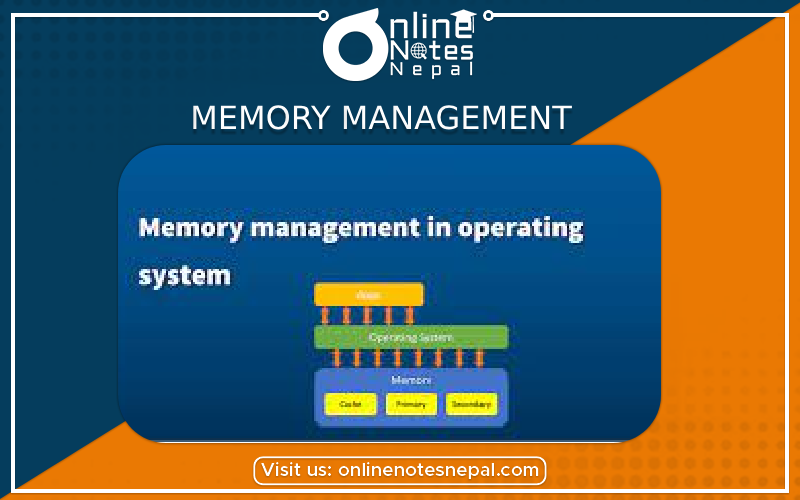Published by: Anu Poudeli
Published date: 31 Jul 2023

Memory management is an important component of modern computer systems and operating systems. It entails organizing and controlling a computer's primary memory (RAM) in order to optimize its usage and ensure effective allocation and deallocation of memory resources. Memory management is critical for system stability, performance, and responsiveness.
Here are some important memory management topics:
1.Memory Organization:
Memory hierarchy in modern computer systems often consists of numerous tiers, ranging from high-speed, small-capacity caches to bigger but slower main memory (RAM) and even slower secondary storage such as hard drives or solid-state drives (SSDs). Memory management is coordinating data transfer between these several memory levels in order to reduce access times and improve performance.
2.Address Spaces :
Memory management enables programs to have their own separate address spaces. This means that each process can access its own dedicated area of memory without interfering with the operations of other processes. The operating system guarantees that processes are properly isolated, preventing illegal access to memory locations belonging to other processes.
3.Allocation of Memory:
Memory allocation refers to the process of allocating memory to running processes or programs. There are several allocation approaches, including fixed partitioning, dynamic partitioning, and segmentation, each with its own set of benefits and drawbacks. The allocation method utilized is determined by the operating system and its requirements.
4.Memory Deallocation:
When a process no longer requires a memory block, it must release it so that it can be used by another process. Memory deallocation is critical for avoiding memory leaks, which can eventually lead to memory exhaustion and system instability.
5.Virtual Memory (VM):
Virtual memory is a memory management approach that allows the operating system to utilise external storage (such as hard drives) as a supplement to actual RAM. It gives applications a bigger address space than what is physically accessible in RAM, allowing for the execution of larger programs.
6.Algorithms for Page Replacement:
Page replacement algorithms play an important role in determining which pages should be moved into and out of RAM in systems that use virtual memory. Least Recently Used (LRU), for example, is a popular algorithm.
7.Fragmentation:
Memory is fragmented when it is separated into small, non-contiguous blocks, resulting in inefficient memory consumption. External fragmentation, in which free memory exists in short portions spread across the memory, and internal fragmentation, in which assigned memory is more than what is required, resulting in wasted space, are the two types.
8.Memory Security:
Memory management prevents processes from accessing memory regions outside of their assigned address spaces. Memory protection techniques prohibit illegal memory access, ensuring system stability and data security.
9.Swapping:
Swapping is the technique of transferring whole processes between RAM and secondary storage. When the available RAM is insufficient to support all active processes, the operating system may temporarily switch out some programs to make room for others.
10.Memory Management:
Memory management allows processes to share memory. Multiple processes can access the same memory region via shared memory, allowing for efficient communication and synchronization.
Memory management is an important and critical component of operating systems, and its appropriate implementation has a direct impact on computer system performance and stability. Depending on the system's architecture and requirements, different operating systems employ varied memory management strategies, algorithms, and rules.